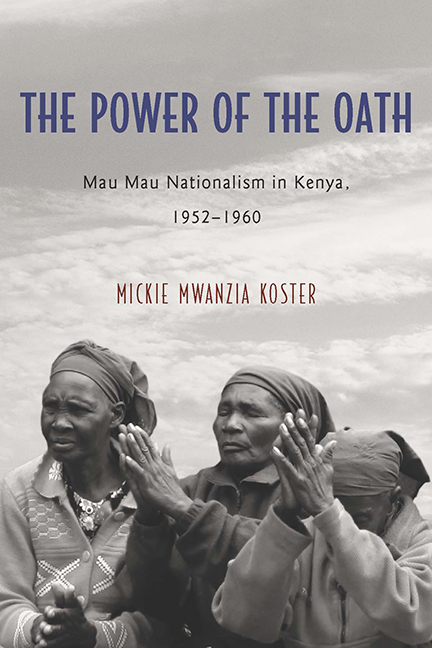2 - The Evolution of the Mau Mau Oath
Published online by Cambridge University Press: 07 May 2022
Summary
There is not much difference. Mau Mau oathing was to fight for independence, they fought for unity, fairness, and truth; that is what the Kamba oath seeks.
—Kimuyu Kyove, July 2011Oathing, a secret and spiritual practice, has been present since the very beginning of time; it has always been feared. It was then and now viewed as powerful. From the beginning of this project in 2009, it was clear that oathing was known in many African communities. When Thomas Ogeto Seve from Nyanza was asked if he believed in the power of the oath, he remarked, “Yes, I do, people still do, especially the old people who knew how serious oathing was. If you took an oath and you were guilty, it would lead to death, madness, or even maiming. An oath's power lay in the fact that in taking an oath, it was like one was cursing him or herself.”
The Kamba also believed in the power of the oath. From this community, the process of oathing among the Kamba is referred to as “beating the kithitu” or “eating the kithitu.” There are many different oath names and types: all are usually invoked for balance and justice. Oathing is not a static activity but a continuous spiritual and religious process. One of the most vivid accounts of this oathing characteristic was displayed during the Mau Mau revolution in which oathing was only limited by the mind and beliefs of those who engaged in the activity. The oath during this period adhered to ancient oathing practices while also providing a dynamism that, based on spiritual intervention, responded to the needs of the participants. This chapter explores the paradox of the oath as an object grounded in beliefs of the past, but renewed and customized as a spiritual source of power to fight in the war.
Many traditional practices are still remembered and have been adapted in various forms to find a place in modern Africa (see appendix C, table C.3). As in other parts of Africa, Kenyan religious and traditional customs were associated with life cycle ceremonies such as birth, initiation, marriage, and death, and were also noted in times of life crisis, sudden illness, famine, disease, war, and so on.
- Type
- Chapter
- Information
- The Power of the OathMau Mau Nationalism in Kenya, 1952–1960, pp. 30 - 53Publisher: Boydell & BrewerPrint publication year: 2016

